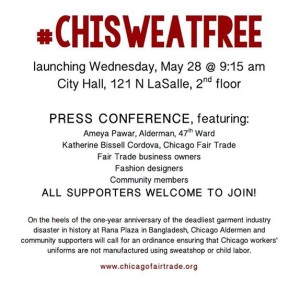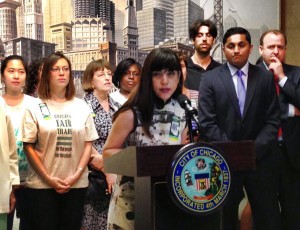Chicago Sweatfree Ordinance is Introduced!
On Wednesday, thanks to Chicago Fair Trade, a Sweatfree Ordinance was introduced in Chicago’s City Council. The campaign is part of a larger campaign called Sweatfree Communities. The campaign is brilliant, and here’s why: it calls on municipalities, states, religious denominations, school districts–basically any large body–to use large-scale purchasing power to create a sea change in the garment industry.
Why is this important? As a small designer trying to manufacture ethically, all I can do is avoid sweatshops and support contractors and suppliers who are already manufacturing ethically. While doing so helps me to sleep better at night, as a small designer, I lack the financial leverage to pressure contractors to pay cutters and stitchers fair wages and to make large scale changes in the garment industry. Likewise, as a consumer, I can avoid brands that use sweatshop labor and instead purchase clothing from ethical brands or buy vintage and thrift items, but the loss of my disposable income alone is not enough to cause big brands like Walmart, Gap, etc, to monitor contractors and ensure that workers are paid a fair wage, that no child labor is employed, and that workers labor in a healthy and safe environment.
Reading my statement at Chicago Fair Trade’s May 28th press conference
While I believe that our individual choices are very important, clearly we can do more to create change when we organize. Our tax dollars fund multi-million dollar contracts. It’s our responsibility to insist that these dollars are given to ethical manufacturers. The multi-million dollar contract is quite a carrot. In order to keep it, uniform vendors who have contracts with the City must agree to make their supply chains transparent. Further, other municipalities who have already passed similar ordinances, such as Los Angeles, St. Louis, Milwaukee, and Seattle, have also included investigation mechanisms in their ordinances. For example, the city of Los Angeles created a position within city government for the monitoring of uniform purchases. In addition, these cities have also joined the Sweatfree Purchasing Consortium, an organization that pools and shares resources. Ethical contractors are listed on their websites, and new vendors who want to be approved as sweatshop free are inspected by the Consortium. If they aren’t yet sweatfree (meaning that they respect basic health, safety, and labor rights and allow workers to anonymously report complaints to the Consortium), then they are given a list of recommendations to correct any issues, and ample time to implement changes. If they choose to not comply, then they lose the lucrative contract. A globalized world of trade calls for robust international monitoring and enforcement mechanisms. The Sweatfree Communities allows us as individual consumers to band together and use the power of our tax dollars to call for the end of sweatshops and help to ensure that entirely preventable tragedies like the Rana Plaza factory collapse never happen again.
The ordinance is currently in the review process. Let’s pressure the City Council of Chicago to include monitoring mechanisms in the ordinance. Ideas on how to do so are here.

